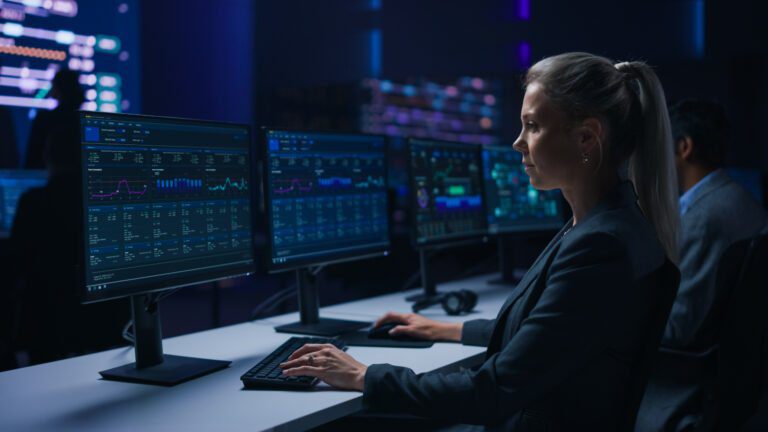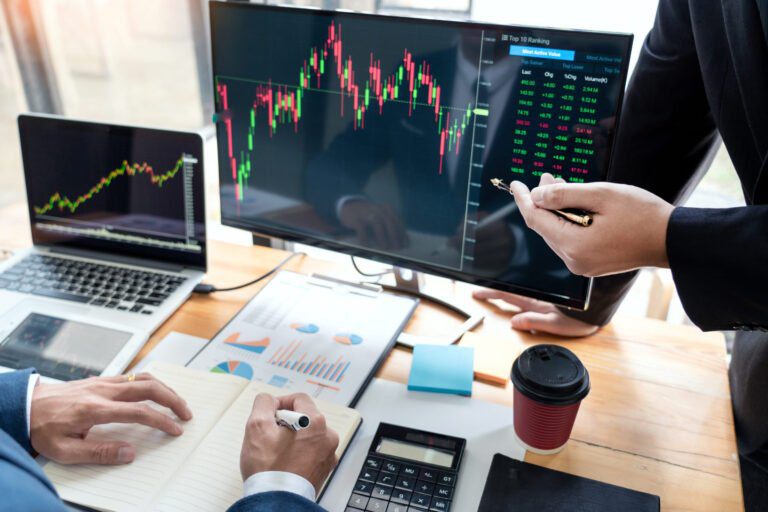Forex stands for foreign exchange, which refers to buying or selling one currency in exchange for another. The FX market is one of the most traded markets, gaining over $6.6 trillion of forex transactions each day. Before you learn how to forex trade for beginners, understand that everyday currency conversions can affect price movements and cause some currencies to be unpredictable and inconsistent.
When it comes to forex trading, learning how to trade is more than learning the ropes in a practical and analytical sense – you need a strategy that works for you and gets results. In this article, we have collated a guide on forex trading for beginners to help newcomers understand the everchanging investment sector and grow their skills as traders.
What is the foreign exchange market?
To fully understand forex trading, you must familiarise yourself with the foreign exchange market. The name Forex is short for foreign exchange, and you will often see it abbreviated to just FX. This market trades currencies and is currently the biggest market in the world. It is not something to take lightly. Governments also trade currencies through the foreign exchange market, which helps to balance the economy.
Compared to the stock market, which trades with physical exchanges, the foreign exchange market is decentralised and without an official foreign exchange location due to every currency traded. As everyday internet users become familiar with trading in 2022, forex is perfect for professional traders and those looking to make additional money.
The aim of the game – How to forex trade for beginners
The overall goal when trading in forex is to decipher which currency will increase or decrease compared to other currencies. But nothing is ever that straightforward. Each is accessible on the foreign exchange market, but some are too inconsistent.
Anything that goes on in the world can affect the foreign exchange market. Brexit, natural disasters and even something across the globe can make all the difference. Traders must take the time to understand the international ongoings and how they might affect the market to be successful in forex. However, know that forex traders do not trade every currency around the globe. Most will only focus on a few currency pairs to limit risk.
What are exchange rates and currency pairs?
Forex trading focuses on exchange rates, which is very different to the stock market, where you purchase a stock for a particular price and later sell the same amount for a higher value in the future.
An exchange rate is the value used to express how much one currency is worth in another currency – this is considered a currency pair. A currency pair is how it sounds. You pair two currencies together.
Currency pairs are always written using the official currency abbreviation, such as EUR/GBP (Euro/Great British Pound), and can be vice versa. But, keep in mind that the currency on the left in a currency pair is called the base currency. For example, the euro would be considered the base currency, and the British pound is called a quote currency.
What does spread mean?
To understand forex trading, you need to learn the terminology. A spread is a difference between the bid price (sell) and the asking price (buy). Spread is essential and is the method most forex brokers use to levy their clients. By using the spread, forex brokers can ensure they make enough profit on every position opened. A lot, if not most, forex traders are commission-free, meaning that they only profit from the spread, not including withdrawal fees. When you first start forex trading, it is good to research the right forex broker that is competitive and trustworthy on the currency pairs you are looking to trade.
Common terminology you need to know
Forex trading has a whole range of terminology that you must get clued in on for better efficiency when trading. Here’s just some of what you need to know:
- Position: Forex traders use a position to understand exchange rate movements. This is the net amount of a currency pair that expresses any change in a particular pair exchange rate.
- Broker: Forex brokers will carry out your transactions in financial markets for you. They can provide support with the trading process.
- Exchange rate: This is the value of one currency for conversion to another. For example, when travelling to Europe from the UK, the exchange rate of the euros you purchase with GBP means you could get more or fewer euros for your money depending on the exchange rate.
- Pip: Pip stands for a percentage point – this explains the slightest change in a currency pair exchange rate. The size of a pip for most currency pairs is 0.0001.
- Leverage/margin: Leverage is when you take funds and leverage them to optimise your earning potential. This is the size of the trading position you can control with a particular amount of margin or money is used as a deposit in a trading account and is held by the broker as collateral against trading losses.
- Long/Short: You would take a long position when you believe the pair exchange rate will rise and decide to take a short position when you feel the exchange rate may fall.
- Risk/reward ratio: A risk/reward ratio is the estimated profit potential for each amount risked.
A step by step guide
Forex trading is not to be mistaken for gambling and quick wins. It focuses on probability, which you need to understand before getting started. Without the knowledge of the game, you might risk making trades without any real chance of gaining. Here’s some tips on how to forex trade for beginners.
Selecting a broker
In a world where the forex industry is booming, there are plenty of forex brokers to choose from, and it is best to start with finding out what each can offer you. After learning how probability can help you, selecting the right forex broker should be more straightforward. Ensure to check reviews and work with a trusted forex broker that can help make transactions simple and with limited risk.
Opening your account
When you have selected your broker, they will often offer a variety of accounts, which can be tough to choose if you aren’t sure what trading style you want to focus on. When starting, it is best to open an account that doesn’t require a large sum of money and allows you to trade in smaller amounts to learn more about the industry. Take the time to find a trading platform that is simple to use – this is crucial since trading is impossible without a platform to work on!
What is your risk management strategy?
As with any activity with large amounts of money involved, a risk management strategy is essential. The preparation process will help you become more well-equipped to start trading. A risk management strategy applies rules to follow that can limit the risk and effect of any losses. For example, one main rule to consider is that you only trade 1% of the funds in your trading account per trade. This helps the account last longer and gives the ability to research what works and what doesn’t.
Dip into your analytical mind
Data is everything, especially when making big decisions. Studying the market allows you to develop your risk management strategy and enhance your profits. Fundamental analysis helps you estimate how the market might move based on news events. This can include current events like inflation or Brexit.
Technical analysis involves using many different tools to measure probability more accurately. To get a real grasp of forex trading, you need knowledge of both areas.
Time to trade
After learning what you need to know, time for the most exciting part – making your first trade. Comprehending the entire process won’t happen until you start taking action. This is where you will truly discover what works best for your strategy, and you may find yourself changing it entirely after putting theories into practice. However you make your first trade, go into it understanding that there is a risk of losses.
Winning isn’t always an option, and this is normal to expect. You might even find that you are constantly gaining a profit, and while that is fantastic, always expect the risk of peril.
Continue to educate
The confidence that comes with forex trading is incredible, but you should continue to learn the art of trading when in it. Developing knowledge never ends, and learning new trading techniques and styles is critical. Even the most confident traders still have room to learn and advance their skills. Everything can change overnight, and if you stop learning new trends or possibilities, you could risk losing your earnings.
Key considerations to note
- Keep your focus: Manage expectations by not focusing too much on the possibility of profit and look to work on strategy.
- Never invest more than you can afford to lose: Gambling without the funds and knowledge of probability is a game already lost.
- Pick a strategy and continue to develop it: As you gain more knowledge, switch it up and learn something new. Education is key!
- Remove emotion from the equation: Keeping emotions out of the decision-making process is pivotal. Only trade with your strategy in mind.
- Keep an eye on current events: Keep track of what is happening in the world around you to make crucial decisions accordingly.
- Prepare for loss: Even the most advanced strategy can lead to a loss. It is a game of the unknown, and well thought out decisions can either win or lose depending on the market and how quickly it can change.
How Financial Markets Online can help you
For new traders seeking to generate an additional income stream from the FOREX market, our senior trading team have developed an award-winning online forex course to assist traders in becoming confident and consistent traders in a short period of time. This also comes with an option to gain unlimited access for no cost. So you can comfortably dip your toes in the market and find the perfect strategy for you before committing further.
There is still so much more to learn. Get in touch with us today to discover more about our successful forex training courses that can further advance your forex knowledge and experience. Soon you will know everything you need to know about how to forex trade for beginners.



